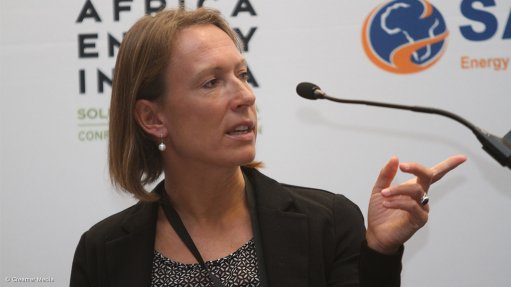
Swiss Re head of market development in Africa Christina Ulardic
Photo by: Duane Daws
The mass deployment of often-overlooked mini, or small-scale, hydropower projects to complement existing energy generation in Africa emerged as a key theme during a panel discussion at the Africa Energy Indaba, in Sandton, on Tuesday.
A panel, comprising four industry proponents, agreed that, with increasingly complex financing options and growing concerns around the environmental impact of large hydropower projects, smaller projects of less than 20 MW could fill a critical gap in electricity generation on the continent.
Swiss Re head of market development in Africa Christina Ulardic pointed out that Africa had managed to bring into operation only 5% of the continent’s estimated hydropower potential.
With plans for several large projects being finalised, a focus on diversification was needed, particularly as financing structures were becoming increasingly complex for larger projects, with governments having less capital to spend, and the environmental impact of such projects increasingly under the microscope.
Ulardic pointed to the potential of implementing a programme of mass deployment of mini hydropower systems much in the same way as had been done with solar power.
In South Africa, several smaller-scale solar projects were increasingly being constructed to aggregately feed into the national electricity grid or provide independent power off-grid.
Much attention was currently placed on large-scale hydropower projects in Africa, as the continent remained mostly in the dark, with the perception that a massive project would be the end-all solution to fast-track electricity generation, Gilbert Gilkes and Gordon international hydrosales manager Andy Eaton said.
He cited the “massive” potential in Zambia and Rwanda, where small-scale projects had been overlooked in favour of larger hydropower operations.
Mini and micro hydropower operations provided many benefits to struggling African nations, including that little civil construction work was required; that projects could be completed within one to two years; reduced construction complexity, particularly in rural regions; the use of rivers or building small canals, as opposed to building dams; and the rapid pace in getting the operations on line.
Meanwhile, the roll-out of a complementary tag-team system between hydropower and solar power could benefit the continent, with solar power supporting and bearing the load of electricity generation during periods of low rainfall, Energy and Water Resources Engineering specialist consultant Bohuslav Barta pointed out.
He further noted that such projects could be initiated in rural regions that rely on small-scale, but expensive and environment-unfriendly forms of electricity generation, such as diesel.